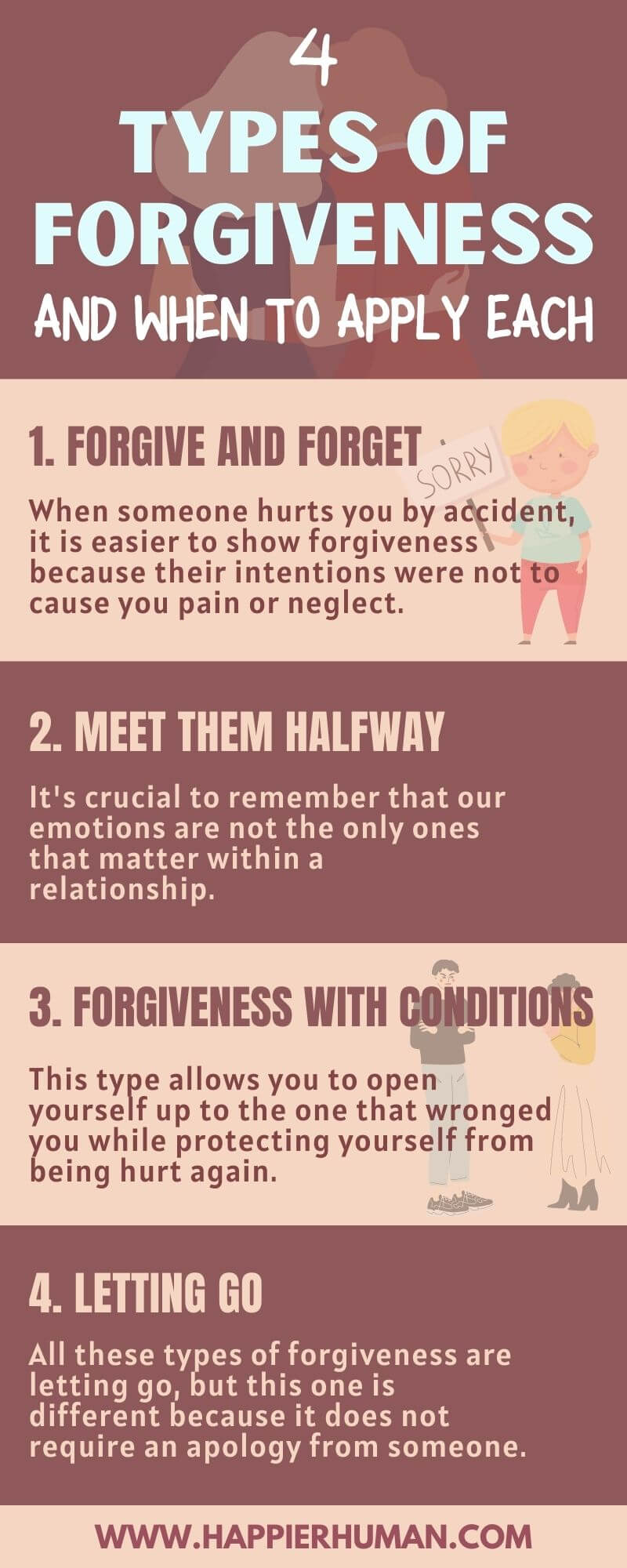There might be affiliate links on this page, which means we get a small commission of anything you buy. As an Amazon Associate we earn from qualifying purchases. Please do your own research before making any online purchase.
When someone has caused us pain, it is only natural to harbor resentment against the individual. However, holding a grudge keeps negative emotions locked away. The bitterness leaves you with stress, depression, and loss of hope in people.
You should not and cannot allow any such individual to hold this kind of power over you. Forgiveness is a great way to rid yourself of the burden of a grudge, and this article will teach you all about the power of forgiveness.
Forgiveness may not always be easy, but it doesn’t always have to be hard either.
What is Forgiveness?
Forgiveness is the power to let go of resentment towards someone who has caused you harm. It's crucial to understand that forgiveness does not condone an individual's actions, but instead allows you to heal from any negative feelings.
The most important thing to remember about forgiveness is that you are the only one who can decide if and when to forgive another person. Meaning the feelings of the other person should come second to your own.
If you choose to forgive someone, it does not mean you are excusing the behavior of the person who harmed you. Instead, you are allowing yourself to heal from the wounds they caused. If you turn away from forgiveness, then the consequences only hurt you in the end.A grudge can cause depression, higher stress levels, and distrust of others. Do not allow this type of adverse effect to influence your life.
That said, we understand how difficult it can be to practice forgiveness. You are only human, born with the fight or flight response. Your feelings of pain, resentment and anger are worth acknowledging… provided they don’t engulf you.
It's okay to have negative emotions towards someone who has harmed you. Just remember not to allow these emotions to linger for too long. The person who hurt you may be a friend, a family member, or significant other. You don't want your feelings of resentment to ruin a meaningful relationship.
You are the biggest obstacle in overcoming the mental capacity for forgiveness. Believe us when we say you have the cognitive ability to do so. With that, let’s go over the four types of forgiveness that lead to a happier and more fulfilling life.
1. Forgive and Forget
The forgive and forget type of forgiveness is the easiest to achieve because it typically derives from an unintentional hurt. Meaning, we as humans make mistakes, and those mistakes may lead to the pain of others. When someone hurts you by accident, it is easier to show forgiveness because their intentions were not to cause you pain or neglect.
It is crucial to quickly give forgiveness in these situations because mistakes like these happen to everyone. Many feel extreme guilt if they did not intend to hurt someone, but did so anyway. We want to be forgiven for causing pain to someone without cause. Accidents happen, and people deserve to be forgiven for such misfortunes. Here is a scenario where practicing the forgive or forget types of forgiveness may occur.

Scenario: You have been working on a painting for weeks. Today, you decide to show it to your friend. Your friend is amazed by your talent and leans in to take a closer look. Unfortunately, they fail to notice your set of acrylic paints sitting on a stool next to the painting. Your friend accidentally bumps the stool and a mess of paint splashes all over your painting. You stand in shock as your friend frantically apologizes.
In every sense, your friend made a terrible mistake. Though, it is evident that it was an accident. Your friend did not intentionally throw paint at your work of art, but accidentally ruined your piece… the piece in which you spent countless hours trying to perfect. It hurts, and you are angry. You must admit to yourself and your friend that it was an accident. It is okay for you to be upset and mourn your work of art, but nothing can be done besides forgive them.
One of the best ways to get through this type of forgiveness is to remember that everyone makes mistakes. No one intended to hurt you, and life throws unexpected challenges at us every day. The best thing to do is to let yourself feel your emotions and then go through forgiveness. If you still need some inspiration, here are 71 quotes that aim to help you forgive and forget.
2. Meet Them Halfway
Believe it or not – sometimes you are partially to blame for the pain someone has caused you. Miscommunication or the inability to see another person's point of view can cause unexpected pain in a relationship. We don't believe that it is our fault in how someone else acts, but we do have a part in their emotional state. It's crucial to remember that our emotions are not the only ones that matter within a relationship.
Even though a person may say they committed a specific act because of you, that does not mean you deserve harm. It means that you must look within yourself to find why this person acted deliberately to harm you. A lot of the time, you see these types of forgiveness within relationships. Here is an example of what can be done in a meet them halfway style of forgiveness.
Scenario: Your husband is going through a lot. He was fired from his job and dealing with family issues. Unfortunately, you have been very busy at work and cannot be there for him as often as you wish. He begins expressing his emotions by yelling at you and calling you horrible names one day. You try to console him, but the words hurt your feelings, and you tell him to leave the house. The next day he apologizes for his outburst, but you still feel incredibly hurt by the terrible words he called you.
The truth is, your husband should never speak to you in that manner, and he should apologize. However, try to think why your husband felt so emotional about you, to begin with. Could you have been there for him more than you were before? It's important to ask yourself these questions before forgiving your husband. You have to look at the other person's perspective, in this case, to help you find forgiveness. It is only that way you both can find inner peace and work to make your relationship that much stronger.
Suppose you find yourself in a situation where you played a role in someone hurting you, like the situation above. It's best to reflect on your actions. Please, do not confuse meet me halfway with ignoring the problem. If someone intends to hurt you, they are in the wrong. And yet, if you understand why they hurt you, then maybe it's okay to apologize as well. The best case would be that both parties realize their mistakes, apologize, and grant forgiveness. This model is excellent practice for relationships to grow through communication.
3. Forgiveness with Conditions
Forgiveness is a beautiful tool to free yourself from negative emotions towards someone else. Sometimes, someone has hurt you terribly, but you want to forgive them. You just don't want to get hurt again. Forgiveness with conditions is an ideal type of forgiveness because you can set boundaries.
Our loved ones are sometimes the people that hurt us the most. Although family is blood, they do not have the right to mistreat you. There comes the point where a toxic family member must learn they cannot treat another family member like excess. Family is family, so it isn't easy to fully push them out of your life. The forgiveness with conditions type is a great way to forgive by protecting yourself.
Scenario: Your brother always got into trouble growing up. He would hang around the wrong crowd, but you loved spending time with him when you were young. Your brother began abusing substances as an adult, and you tried everything to help him. You paid for his rehab, offered him a place to stay, and even talked him into finding a job. Unfortunately, his addictive behavior got the better of him, and he stole a large sum of money from you. You feel betrayed and lose contact with him for years. Out of the blue, he contacts you and tells you he has been five years sober. He apologizes for everything and wants to be in your life again, but you are hesitant.

Although you are happy about your brother's recovery, you cannot help but feel pained. You cannot shake the fact that he stole a large amount of money from you as you were helping him recover. You feel you can't trust him, but you miss being in his life. So, you set up boundaries to protect yourself from getting hurt again. You do not allow him inside your home or around any of your friends and family. You take it day by day and try to forgive him.
Forgiveness does not take place in a day. Sometimes when we say we forgive someone, it takes time to feel the resentment fade. The best way to help emotions fade away is through forgiveness with conditions. This type allows you to open yourself up to the one that wronged you while protecting yourself from being hurt again. It's one of the ways to heal and forgive. Lastly, here are 19 strategies to help you get rid of anger and resentment.
4. Letting Go
Life is unfair. There are times when you get hurt, and no one is there to say sorry. Often, people do not take responsibility for their actions, leaving others hurt and empty. There is only one way to deal with anger, hurt, and resentment… by letting go. In a way, all these types of forgiveness are letting go, but this one is different because it does not require an apology from someone.
The apology is the first step in finding forgiveness. For some reason, people have difficulty apologizing, whether it's from stubbornness or inability to face the truth. Either way, forgiveness can be stalled if an apology is missing from the person. How can you forgive someone who is not even sorry about what they did to you? One of the hardest things to do is forgive them by letting go of your own emotions. Accept what they have done to you and just allow the feelings to seep away. Here is an example for you.
Scenario: All your life, your mother judged you. Whether it was your weight, life choices, or partner, she loved to make you feel less than her. Whenever you brought up your feelings to your mom, you would brush them off. She was able to turn the blame back on you and say, “If you were a better child, then maybe I could be a better mom.” No matter what you do, you never live up to her expectations. You have never been close to your mother because she has nothing but negative things to say in your presence.
Trying to find an apology from someone who believes they did nothing wrong is useless. The anger and pain you feel from a loved one who refuses to see you is heartbreaking. It isn't easy to reach within yourself and find a place for forgiveness. Just remember, with this step, you do not forgive the horrible things your mother has said to you. Instead, you are accepting them and moving on. You are breathing them into yourself and letting them go. The words and actions your mother has should not hold power over you. That way, you can live your life without your mother's acceptance.
It isn't easy to achieve this type of forgiveness. Letting go does not come naturally. Our emotions harbor within ourselves, and we beg for someone to apologize for making us feel so bad. It's an unfair circumstance, but you must be strong. There are ways to help you let go, such as writing a letter to the person who harmed you that you have no intention of sending. Writing your feelings and emotions down on paper towards the person that hurt you is a great way to help you let go. A letter is an outlet for the truth and a guide to forgiveness. It is a great way to practice with all types of forgiveness.
Final Thoughts on Types of Forgiveness
We hope you can understand that forgiveness is difficult to achieve, but very much worth the effort. Forgiveness can lead you to happiness and motivate you to find your peace. Forgiveness is one of the most humble and enlightening things you can ever do.
Happiness soon follows forgiveness. And isn’t true happiness what we all seek? Not just contentment. Happiness is so important in our lives... and allowing yourself to forgive, whether it’s about forgiving yourself or another person, will get you one step closer to it. Remember to follow these types of forgiveness to reach your happiness.
Finally, if you want to increase your happiness and life satisfaction, then watch this free video that details the 7-minute habit for planning your day to focus on what's important.


